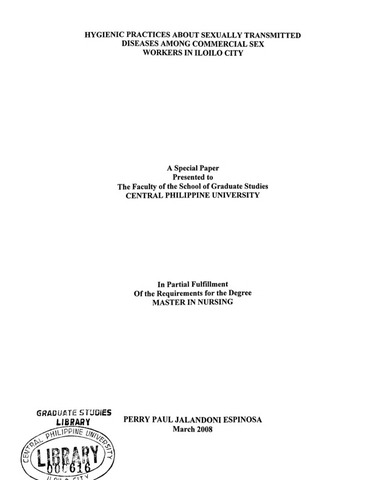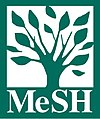Hygienic practices about sexually transmitted diseases among commercial sex workers in Iloilo City

Page views
385Petsa
2008May-akda
Tagapayo ng Tesis
Magbahagi
Metadata
Ipakita ang buong tala ng itemAbstract
This study determined the knowledge about sexually transmitted diseases, services offered by hygiene clinic, and hygienic practices of commercial sex workers registered with the Social Hygiene Clinic in Iloilo City.
The respondents of this investigation were 11 males and 157 female commercial sex workers. This is a descriptive-correlational study that was done using one shot survey design. The respondents of the study were selected using simple random sampling.
A self-administered instrument and a personal interview were done to those who have difficulty in answering the research instrument. Appropriate statistics were used in the analysis of description, differences, and relationship using the statistical package for the social sciences (SPSS).
Major Findings
1. The majority of the respondents were female, single, and below 24 years old. Most of them had attained high school education and had less than three years working. Majority have no history of STD.
2. Majority of the respondents were aware that STDs can be transmitted from one person to another through sexual contact and can be prevented through safe sex practices. In terms of knowledge on the services of the hygiene clinic, majority said that the clinic offered free consultation and one-on one counseling. However, some of them did not avail of the diagnostic tool in detecting STDs.
3. Majority of the commercial sex workers did not have correct promotive hygienic practices. In terms of preventive practices, most of them visited the doctor regularly and attentively listen to physicians’ recommendations. In terms of curative aspect, there was a marked increase in the percentage on the use and taking religiously of the respondents to prescribed medications. Most of them subjected themselves for laboratory test as advised by the physician and stop from work if they manifest signs and symptoms of sexually transmitted diseases. The majority of the respondents have correct rehabilitative practices.
4. The level of knowledge about sexually transmitted diseases does not differ significantly. The z-tests for difference between means in all aspect of practices were not significant at .05 level.
5. The level of knowledge about the services offered by hygiene clinic did not also yield a significant result as indicated by almost the same mean scores. The z-tests for difference were not significant at .05 percent level.
6. The same findings hold true in hygienic practices. The promotive, preventive, curative, and rehabilitative hygienic practices were not significantly related to age, sex, educational attainment, civil status, work experience, and history of STD.
7. The relationship between the knowledge level about sexually transmitted diseases does not show significant bearing to hygienic practices of commercial sex workers.
8. The relationship between the knowledge level about the services offered by hygiene clinic and the hygienic practices of commercial sex workers does not show significant result.
Conclusions
In the light of significant findings of the study, the following conclusions are drawned:
1. The respondents were knowledgeable about sexually transmitted diseases.
2. Majority of the respondents knew the services offered by hygiene clinic but some did not avail of the diagnostic tools but they did not have correct promotive hygienic practices.
3. Most of them were following preventive, curative, and rehabilitative aspects of hygienic practices. They were using condom, following physicians recommendations, taking medicines religiously, allowing self to be admitted for infection treatment, and joining support groups in the prevention of sexually transmitted diseases.
4. There is no significant difference noted on the knowledge about STD, knowledge on the services offered by hygiene clinic, and the hygienic practices of commercial sex workers when the respondents were classified according to age, sex, educational attainment, civil status, work experience, and history of STD.
5. There is no significant relationship on the knowledge about STD, knowledge on the services offered by hygiene clinic, and the hygienic practices of commercial sex workers when the respondents were classified according to age, sex, educational attainment, civil status, work experience, and history of STD.
Paglalarawan
abstract only
Mungkahing Sipi
Espinosa, P. P. J. (2008). Hygienic practices about sexually transmitted diseases among commercial sex workers in Iloilo City (Unpublished Master's special paper). Central Philippine University, Jaro, Iloilo City.
Uri
Special paperMga Paksa
Mga keyword
Kagawaran
School of Graduate StudiesDegree
Master in NursingLokasyon ng Istante
GSL Theses 610.73072 Es65h
Pisikal na paglalarawan
viii, 82 leaves
Collections
- Master in Nursing [37]



